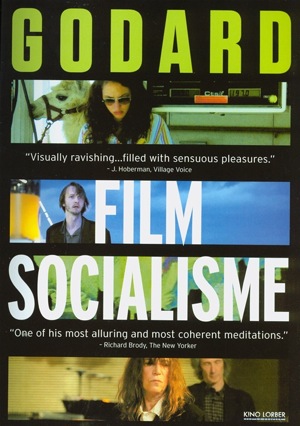CHICAGO – Patrick McDonald of HollywoodChicago.com appears on “The Morning Mess” with Dan Baker on WBGR-FM (Monroe, Wisconsin) on March 21st, 2024, reviewing the new streaming series “Manhunt” – based on the bestseller by James L. Swanson – currently streaming on Apple TV+.
DVD Review: ‘Film Socialisme’ Explores Mediterranean Life Through Abstract Collage
CHICAGO – The notoriously confounding new film from Jean-Luc Godard baffled many critics during its 2010 premiere at Cannes. The legendary director was conspicuously absent from the festival, leading some to believe that his refusal to give interviews was reflected in the film’s final title card, “NO COMMENT.” Yet after a careful analysis of “Film Socialisme,” it’s clear that Godard has plenty to say.
This is the sort of picture that functions more as a two-hour museum projection than a feature film. It’s bound to transfix some onlookers, while quickly repelling others into the next room. As a call for unity in the Mediterranean, Godard runs the risk of alienating the very people he intends to reach with his message. Only film buffs and Godard experts will be able to piece together this fragmented collage after an initial viewing. Everyone else will have to do their homework, but I’d argue that it’s well worth the effort.
 DVD Rating: 4.5/5.0 |
It’s thrilling to see one of the world’s greatest living filmmakers continue to tirelessly experiment with his beloved art form at the ripe age of 80. Just as digital photography opened untapped reservoirs of creativity for David Lynch in 2006’s equally ambitious “Inland Empire,” it appears to have had a similar effect on Godard. By following (and directly referencing) Sergei Eisenstien’s method of achieving meaning through montage, the director has created a dizzying three-part meditation on the clash between mankind’s shared goals and the barrier of ethnic division.
The theme of globalization is also prevalent throughout the film, as Godard juxtaposes old-fashioned elements, such as ancient currency and clunky modes of transportation, with the rise of the computer age, where human connection and identity have become more abstract than ever. Two historical touchstones continue to preoccupy Godard’s haunted characters: World War II and the Spanish Civil War, the latter of which plays a crucial role in the film’s first third. An assortment of agents are on the lookout for gold that Spanish Republicans had sent to Russia in 1936 with the expectation that it would be returned after the civil war. Now that very gold appears to be encircling the neck of a young girl, Alissa (Agatha Couture), on a cruise ship sailing from Algiers to Barcelona.

Nadege Beausson-Diagne as Constance in Jean-Luc Godard’s Film Socialisme.
Photo credit: Lorber Films
What makes the film’s initial 45 minutes even more intriguing is the fact that it’s set on the Costa Concordia, which made headlines last month after it capsized off the Tuscan coast. Cinematographers Fabrice Aragno and Paul Grivas capture images of arresting beauty even through the murkiest of lenses, while Godard repeatedly cuts to title cards with variations on the phrase “Things Like This” spelled out in Kubrickian lettering. Enhancing the film’s portrayal of a disconnected world are a series of disembodied voices that often don’t match with the onscreen action. If the last head-scratching scene in Alain Resnais’s “Wild Grass” were stretched to feature length, it may have looked something like this. Overlapping dialogue eventually leads to overlapping title cards, yet film lovers will see these multiple layers as an enticing challenge rather than an infuriating obstacle. Every once in a while, a line will resonate that cuts straight to the heart of the material, such as when footage of a dimly lit casino is accompanied by this dialogue: “Money was invented so people wouldn’t have to look each other in the eyes.” At each stop along the cruise, Godard utilizes still frames and archival footage to summarize each location. When the ship reaches Palestine, a title card warns, “ACCESS DENIED.”
 Film Socialisme was released on Blu-ray and DVD on Jan. 10, 2012. Photo credit: Lorber Films |
Once the film reaches its self-contained second act, Godard’s visual style becomes less frenzied as he explores an extended vignette about a French family. The patriarch, Jean-Jacques Martin (Christian Sinniger), is attempting to sell his business while his wife, credited solely as “Mother” (Catherine Tanvier), plans to announce her candidacy for President of France. Her rebellious children, Florine (Marine Battaggia) and Lucien (Gulliver Hecq), are so fed up with bureaucratic politics that they’ve threatened to run against her in the upcoming election. Though these characters receive more screen time and are beautifully played by the first-rate cast, they’re merely four more human props used by Godard to shape his symbolic canvas. Florine’s name is taken directly from a Balzac novel, as indicated by the repeated close-ups of her reading material (such as Balzac’s “Lost Illusions”). At the end of this sequence, Godard blatantly reveals that the family is named after a WWII-era French resistance group that had the motto, “To Liberate and Federate.”
It’s in the final 18 minutes that “Film Socialisme” fully acknowledges and embraces its true identity as a cinematic essay of great depth and towering ambition. Godard revisits the cruise liner’s various destinations while tying together the film’s thematic threads. He champions the socialist activism in Barcelona, draws provocative parallels between “Jews and Muslims” and comes up with a succinct equation to explain the tragedies in Greece: “tragedy plus democracy equals civil war.” He also points a sharply critical eye at the U.S. by including a fleeting shot of Congress and the line, “North Americans claim to liberate people and yet oblige them to feel vanquished.” Suddenly, the disconnected fragments of Godard’s film coalesce into a political statement of stunning power and an aesthetically appropriate portrait of a diverse region unified by a shared humanity.
“Film Socialisme” is presented in its 1.85:1 aspect ratio and includes the film’s theatrical trailer (which zips through the entire film in one minute and fourteen seconds), an essay from Godard historian Richard Brody (who boldly dubs the film as Godard’s “most coherent political picture”) and two subtitle options. It’s easy to see why viewers may have been even more baffled by the theatrical cut, since it contained the director’s fragmented “Navajo” English. Yet this disc thankfully includes an infinitely more comprehensible English translation. For example, the first line, “White…Algiers…Mireille le Moko” now reads “The white city of Algiers. When Mireille abandons Pepé le Moko.” If your only experience of this picture was in the theater, you may want to give it another look.
 | By MATT FAGERHOLM |


